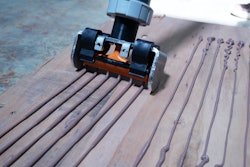A new treatment for creating a more durable wood could end up giving steel a run for its money.
Engineers at the University of Maryland have developed a new “Super Wood” that is 10 times stronger and 12 times tougher than natural wood, according to findings published this month in Nature.
Though its strength is said to rival that of titanium alloy, the toughened timber is able to maintain its lightweight quality, weighing six times less than steel, Co-Research Leader Teng Li said in a press release.
Creating the high-performance wood is a two-step process, starting with boiling the wood in liquid sodium hydroxide and sodium sulfite to extract lignin (the “glue” between the cells) and hemicellulose from the natural wood. A hot-pressing of the wood following the boil then collapses the cell walls and leads to the “complete densification” of the material.
The method has been shown to work for several different types of wood, according to the study, and compresses the wood so that it becomes five times thinner than its original size.
“Our processed wood has a specific strength higher than that of most structural metals and alloys, making it a low-cost, high-performance, lightweight alternative,” the study’s abstract states.
The research team leader, Liangbing Hu, an associate professor of materials science and engineering, said the new material has the potential to be utilized for buildings, cars and airplanes, or “any application where steel is used.”
Researchers tested out the endurance of the treated wood by firing “bullet-like” projectiles at it at close range. The projectiles passed right through the natural wood, but with the Super Wood, they were stopped partway through.
There was no mention of the wood’s commercial readiness yet.





















